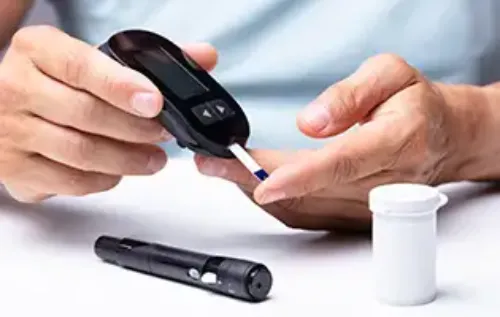Hypoglycemia
"90% of hypoglycemias occur from external causes and can often be prevented with proper health education".
DR. JAVIER ESCALADA
DIRECTOR. ENDOCRINOLOGY AND NUTRITION DEPARTMENT

Hypoglycemia is defined as the clinical syndrome that occurs in situations where blood glucose concentrations are below 50 mg/dl.
Sometimes hypoglycemic symptoms can occur with normal glucose levels, this occurs when the drop in levels occurs abruptly.
This can occur in anyone treated with insulin or oral antidiabetic medications such as sulfonylureas.

What are the symptoms of hypoglycemia?
The symptoms that appear are manifested by different symptoms or signs, depending on the mechanism that produces them:
- Due to the discharge of adrenaline: anxiety, restlessness, irritability, palpitations, tachycardia, pallor, muscle weakness, tremor, intense sweating and feeling of hunger.
- Due to the deficit of glucose in the central nervous system: headache, slowness, difficulty in speaking, alteration of behaviour with irritability, aggressiveness, confusion..., somnolence, double vision, negativism, psychosis and even convulsions.
The faster the blood glucose figure falls, the more the symptoms due to adrenaline discharge predominate.
The most common symptoms are:
- Anxiety.
- Irritability.
- Headache.
- Sweating.
- Loss of consciousness.
Do you have any of these symptoms?
You may have hypoglycemia
What are the causes of hypoglycemia?
90% of hypoglycemias occur from external causes and can often be prevented with proper health education.
- Imbalance between dose and/or type of insulin administered and the amount of calories provided in the diet.
- Imbalance between dose and/or type of oral antidiabetic administered and the amount of calories provided in the diet
- Excessive or unaccustomed physical exercise.
- Intake of alcohol or medications, such as salicylates, clofibrate, phenylbutazone, and sulfinpyrazone, due to pharmacological interaction with oral antidiabetics.
The remaining 10% occurs due to secondary causes to some organic, autoimmune, tumoral or endocrinometabolic disease.
How do you prevent hypoglycemia?
The best treatment for hypoglycemia is its prevention.
- No food intake should be omitted.
- If intense exercise is to be done, food intake should be increased or the dose of insulin decreased.
- Follow a correct technique of injection and dosage of insulin.
- Carry out the periodic controls that your doctor advises you.
How is hypoglycemia diagnosed?

The diagnosis of hypoglycemia is very simple; you simply need to determine your blood glucose level.
Initially, this will be done by means of a test strip by puncture in the fingertip and later a more exact determination will have to be made in the laboratory.
As a first rule, you should know that if you suspect a hypoglycemia, it should be treated as such. It is preferable to administer sugar when the glucose levels are not low than to stop administering it when they are.
How is hypoglycemia treated?
It is important that the patient learns to recognize the symptoms of this one in order to establish the treatment as soon as possible.
About 10-15 grams of sugar should be ingested, contained for example in two lumps of sugar or a glass of milk or orange juice and three cookies.
If after ten minutes the symptoms have not disappeared, the treatment should be repeated. Once you have recovered you should take foods that contain slower absorption sugars, for example bread, to prevent them from reappearing.
If the hypoglycemia manifests itself with a decrease in consciousness, do not attempt to administer food by mouth but should notify the Emergency Services, which will administer glucose intravenously and if necessary glucagon (a hormone whose action is contrary to insulin, that is, to increase the levels of glucose in the blood).
Where do we treat it?
IN NAVARRE AND MADRID
The Department of Endocrinology and Nutrition of the
of the Clínica Universidad de Navarra
The Department is organized into care units with specialists totally dedicated to the study, diagnosis and treatment of this type of disease.
We work with established protocols, which ensure that all diagnostic tests to be performed are done in the shortest time possible and that the most appropriate treatment is started as soon as possible in each case.
Organized in care units
- Obesity Area.
- Diabetes Unit.
- Thyroid and Parathyroid Disease Unit.
- Osteoporosis Unit
- Other diseases: e.g. Cushing's syndrome.

Why at the Clinica?
- European Center of Excellence in the diagnosis and treatment of Obesity.
- Team of specialized nurses at the Day Hospital of Endocrinology and Nutrition.
- We have a Metabolic Research Laboratory of international prestige.



























